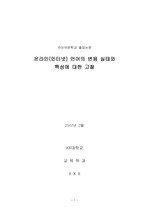

PARTNER
검증된 파트너 제휴사 자료
국어의 탈문법화 현상과 단어화 (Degrammaticalization phenomena and Wordification in Korean)
한국학술지에서 제공하는 국내 최고 수준의 학술 데이터베이스를 통해 다양한 논문과 학술지 정보를 만나보세요.
38 페이지
최초등록일 2025.02.12
최종저작일
2013.08

-
서지정보
· 발행기관 : 국어학회
· 수록지 정보 : 國語學 / 67호 / 107 ~ 144페이지
· 저자명 : 노명희
초록
본고는 국어에서 탈문법화와 관련된 현상들을 검토하고, 이에 해당하는예들을 찾아보았다. 탈문법화에는 단어의 구성성분이 의미는 변하지 않고탈결속 과정을 거쳐 자립성을 얻으면서 단어가 되는 ‘역형태단위화’가 있다. 여기에는 접사적 성격을 지니던 ‘신(新), 대(大)’의 관형화와 ‘초(超), 급(急)’의 부사화가 해당한다. ‘신, 대’는 ‘신여성, 대충돌’ 등에서 접두한자어로쓰이다가 어기에서 분리되어 ‘신 (유망) 직업, 대 (사기) 사건’과 같이 2음절단어 앞에서도 관형사화된 것으로 판단된다. ‘초, 급’도 ‘초고속, 급정지’ 등에서 접두한자어의 용법을 지니다가 ‘초 민망하다, 급 아프다’와 같이 부사로 정착되고 있다.
이에 비해 접두사로 쓰이던 ‘개’와 ‘왕(王)’의 부사화(‘개 좋다, 왕 재미있다’)는 의미의 변화와 함께 문법적 자립성도 얻게 되어 ‘역문법화’로 볼수 있다. ‘개’는 ‘개망나니’와 같이 명사 앞에서 접두사로 쓰일 때와 달리 어기에 대한 품사적 제약도 바뀌어 재구조화되었으며 ‘개 당당하다’에서처럼부정적 의미도 완화되어 의미 변화도 함께 겪었다. 또한 ‘캐 맛있다, 캐 간지나다’ 등 변이형까지 생겨 음운론적 변화도 함께 겪은 것으로 판단된다.
‘어휘화’는 단어가 아닌 요소가 주요 범주인 명사, 동사의 단어 지위를얻게 된 경우가 해당되며, 영어에서 접두사로 쓰이던 ‘안티, 사이버, 미니’등이 있다. ‘안티’는 어휘화의 대표적인 예로, ‘안티기독교’와 같은 예에서는“기독교에 반대하는”이라는 뜻으로 후행명사를 논항으로 취하는 서술어적의미로 쓰인다. ‘안티팬, 안티세력’ 등에서는 후행명사를 수식하는 용법으로쓰이다가 ‘기독교 안티’와 같이 명사 뒤에서 “-에 반대하는 행위나 사람”이라는 구체적인 지시 대상을 가리키게 되어 명사화한 것을 알 수 있다.영어초록
This paper aims to examine the phenomena relating to degrammaticalization and search for relevant examples in Korean. In broad terms, degrammaticalization includes diverse examples which break the unidirectionality of grammaticalizaiton. In addition this paper take into account the wordification process where affixes and bound forms change into words by getting more morphological freeness.
Among degrammaticalization, there is antimorphologization where word constituents change into words by debonding, still preserving their meanings. In this category we include the adnominalization of affixal ‘sin(新), dae(大)’ and the adverbialization of affixal ‘cho(超), geup(急)’.
‘sin, dae’ evolve from the prefixal use such as ‘신여성, 대충돌’ into the adnominal use such as ‘신 (유망) 직업, 대 (사기) 사건’. Likewise ‘cho,geup’ also evolve from the prefixal use into the adverbial use such as ‘초 민망하다, 급 아프다’.
On the other hand the change of ‘gae(개)’ and ‘wang(王)’ from prefixal uses into adverbial uses such as ‘개 좋다, 왕 재미 있다’ show grammatical freeness as well as semantic changes, so this can be considered to be an example of antigrammaticalization. ‘gae’ has undergone three kinds of changes. First, the constraint about the word class of following constituents has eroded. Second, its negative meanings have been bleached. Third, it has acquired its alternate form ‘kae(캐)’ such as ‘캐 맛있다, 캐 간지나다’.
In this paper lexicalization has been confined into the process where non-word elements change into substantial category such as nouns,verbs. The lexicalization examples are ‘안티, 사이버, 미니’ etc. The lexicalization of ‘안티’ has undergone three steps. In the first step, ‘안티’ takes the following noun as its argument, and the meaning of ‘안티기독교’ is “against Christianity”. In the second step, it has acquired noun-modifying function such as ‘안티팬, 안티세력’. In the third step,just after the preceding noun it refers to “a person or an act that is against the preceding noun” such as ‘기독교 안티’, and finally has acquired a noun status.참고자료
· 없음태그
-
자료후기
-
자주묻는질문의 답변을 확인해 주세요

꼭 알아주세요
-
자료의 정보 및 내용의 진실성에 대하여 해피캠퍼스는 보증하지 않으며, 해당 정보 및 게시물 저작권과 기타 법적 책임은 자료 등록자에게 있습니다.
자료 및 게시물 내용의 불법적 이용, 무단 전재∙배포는 금지되어 있습니다.
저작권침해, 명예훼손 등 분쟁 요소 발견 시 고객센터의 저작권침해 신고센터를 이용해 주시기 바랍니다. -
해피캠퍼스는 구매자와 판매자 모두가 만족하는 서비스가 되도록 노력하고 있으며, 아래의 4가지 자료환불 조건을 꼭 확인해주시기 바랍니다.
파일오류 중복자료 저작권 없음 설명과 실제 내용 불일치 파일의 다운로드가 제대로 되지 않거나 파일형식에 맞는 프로그램으로 정상 작동하지 않는 경우 다른 자료와 70% 이상 내용이 일치하는 경우 (중복임을 확인할 수 있는 근거 필요함) 인터넷의 다른 사이트, 연구기관, 학교, 서적 등의 자료를 도용한 경우 자료의 설명과 실제 자료의 내용이 일치하지 않는 경우
“國語學”의 다른 논문도 확인해 보세요!
-
월인석보 권20 훼손 부분의 복원과 이용 66 페이지
≪月印釋譜≫ 卷20의 현존본은, 안타깝게도 <太子須大拏經> 해당 부분이68장부터 83장까지 15장에 걸쳐 지면 하단 부분을 중심으로 심하게 훼손되어 있어 자료로서 이용하기가 어려웠다. 그러나 사실 이는 어느 정도 복원이가능하다. 즉, 훼손 부분에 몇 글자가 들어가는지를 정확히 세어, 底經인<太子須大拏經>을 자세히 검토하되 ≪釋譜詳節≫, ≪月印釋譜≫에서의 전.. -
日本 近代 韓語 資料에서의 副詞格 ‘의’의 過剩 樣相과 그 要因 28 페이지
본 연구는 日本의 近代 韓語 資料인 ≪全一道人≫(1729), ≪朝鮮語譯≫(18세기?), ≪交隣須知≫(1846, 1854)를 중심으로 하여 부사격조사 ‘의’의 실현양상과 그 원인을 살펴보는 데에 목적을 두었다. 일본 근대 한어 자료의 부사격조사로는 ‘의, , 에, 예’가 확인되었으나, 국내 자료와는 다르게 부사격조사 ‘의’가 대표형으로 쓰이는 특이한 현상을.. -
한국어 피동문에 나타나는 격 교체의 비대칭성에 대하여 28 페이지
이 논문은 한국어 접사피동문과 ‘-어지다’ 피동문에 나타나는 격 교체의 비대칭성에 관한 통사론적 분석을 제시한다. 피동접사 파생에 의한피동문은 소유물 논항의 주격과 목적격 교체를 허용하지만, ‘-어지다’ 피동문은 주격만을 허용한다. 이러한 격교체의 비대칭성은 피동접사와 ‘-어지다’의 하위범주화 자질에 의해 설명된다. 즉, 피동접사는 어근구나 vP 에 병합되.. -
경음화, 남은 몇 문제 28 페이지
본고는 수의적인 경음화 ― ㄹ 관형사형 어미 뒤에서의 경음화, 수관형사뒤에서의 경음화, 명사구에서의 경음화 ― 에 대해 긴밀도와 음절수의 관점에서 접근한다. 4가지로 정리할 수 있다. 첫째, ㄹ 관형사형 어미에 후행하는 성분이 의존명사인 경우에는 긴밀도가 높으므로 경음화가 필수적으로 일어난다. 반면, 후행 성분이 자립명사인경우에는 경음화가 수의적인 양상을 .. -
단어 형성의 공시성ㆍ통시성과 음운 현상의 공시성ㆍ통시성 22 페이지
본고는 설령 단어 형성이 통시적인 사건이라고 하더라도 단어 형성시적용된 음운 현상 역시 통시적인가 하는 문제 제기에서 출발하였다. 동일한 음운 현상임에도 그것이 굴절에서 나타나면 공시적인 것으로, 복합어‘X+Y’의 경계에서 나타나면 통시적인 것으로 해석하는 것은 단지 형태ㆍ통사론적인 정보로 음운 현상의 공시성ㆍ통시성을 선험적으로 재단한 것에지나지 않는다. ..
찾으시던 자료가 아닌가요?
지금 보는 자료와 연관되어 있어요!
문서 초안을 생성해주는 EasyAI



